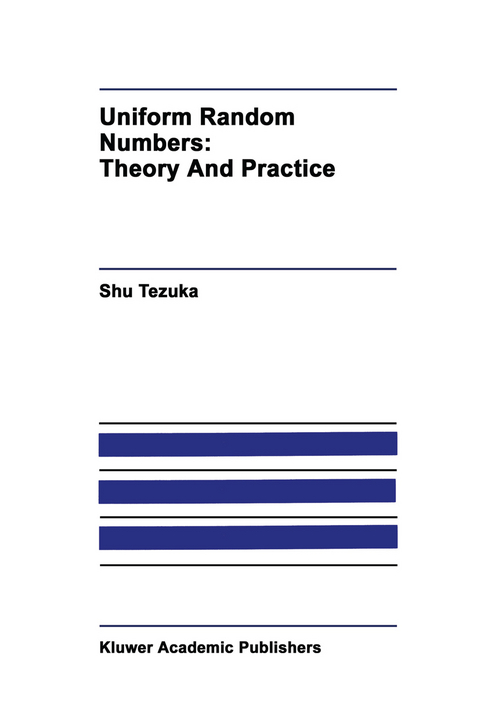
Uniform Random Numbers
Theory and Practice
Seiten
2012
|
Softcover reprint of the original 1st ed. 1995
Springer-Verlag New York Inc.
978-1-4613-5980-7 (ISBN)
Springer-Verlag New York Inc.
978-1-4613-5980-7 (ISBN)
In earlier forewords to the books in this series on Discrete Event Dynamic Systems (DEDS), we have dwelt on the pervasive nature of DEDS in our human-made world. As it is well known to students of simulation, the heart of the random event simulation is the uniform random number generator.
In earlier forewords to the books in this series on Discrete Event Dynamic Systems (DEDS), we have dwelt on the pervasive nature of DEDS in our human-made world. From manufacturing plants to computer/communication networks, from traffic systems to command-and-control, modern civilization cannot function without the smooth operation of such systems. Yet mathemat ical tools for the analysis and synthesis of DEDS are nascent when compared to the well developed machinery of the continuous variable dynamic systems char acterized by differential equations. The performance evaluation tool of choice for DEDS is discrete event simulation both on account of its generality and its explicit incorporation of randomness. As it is well known to students of simulation, the heart of the random event simulation is the uniform random number generator. Not so well known to the practitioners are the philosophical and mathematical bases of generating "random" number sequence from deterministic algorithms. This editor can still recall his own painful introduction to the issues during the early 80's when he attempted to do the first perturbation analysis (PA) experiments on a per sonal computer which, unbeknownst to him, had a random number generator with a period of only 32,768 numbers. It is no exaggeration to say that the development of PA was derailed for some time due to this ignorance of the fundamentals of random number generation.
In earlier forewords to the books in this series on Discrete Event Dynamic Systems (DEDS), we have dwelt on the pervasive nature of DEDS in our human-made world. From manufacturing plants to computer/communication networks, from traffic systems to command-and-control, modern civilization cannot function without the smooth operation of such systems. Yet mathemat ical tools for the analysis and synthesis of DEDS are nascent when compared to the well developed machinery of the continuous variable dynamic systems char acterized by differential equations. The performance evaluation tool of choice for DEDS is discrete event simulation both on account of its generality and its explicit incorporation of randomness. As it is well known to students of simulation, the heart of the random event simulation is the uniform random number generator. Not so well known to the practitioners are the philosophical and mathematical bases of generating "random" number sequence from deterministic algorithms. This editor can still recall his own painful introduction to the issues during the early 80's when he attempted to do the first perturbation analysis (PA) experiments on a per sonal computer which, unbeknownst to him, had a random number generator with a period of only 32,768 numbers. It is no exaggeration to say that the development of PA was derailed for some time due to this ignorance of the fundamentals of random number generation.
1 Introduction.- 2 Preliminaries from Number Theory.- 3 Linear Congruential Generators.- 4 Beyond Linear Congruential Generators.- 5 Statistical Tests.- 6 Derandomization.- A Sample C Routines.- References.
| Erscheint lt. Verlag | 22.12.2012 |
|---|---|
| Reihe/Serie | The Springer International Series in Engineering and Computer Science ; 315 |
| Zusatzinfo | XII, 209 p. |
| Verlagsort | New York, NY |
| Sprache | englisch |
| Maße | 155 x 235 mm |
| Themenwelt | Mathematik / Informatik ► Informatik ► Theorie / Studium |
| Mathematik / Informatik ► Mathematik ► Algebra | |
| Mathematik / Informatik ► Mathematik ► Analysis | |
| Mathematik / Informatik ► Mathematik ► Angewandte Mathematik | |
| Mathematik / Informatik ► Mathematik ► Arithmetik / Zahlentheorie | |
| Mathematik / Informatik ► Mathematik ► Finanz- / Wirtschaftsmathematik | |
| ISBN-10 | 1-4613-5980-5 / 1461359805 |
| ISBN-13 | 978-1-4613-5980-7 / 9781461359807 |
| Zustand | Neuware |
| Haben Sie eine Frage zum Produkt? |
Mehr entdecken
aus dem Bereich
aus dem Bereich
was jeder über Informatik wissen sollte
Buch | Softcover (2024)
Springer Vieweg (Verlag)
37,99 €
Grundlagen – Anwendungen – Perspektiven
Buch | Softcover (2022)
Springer Vieweg (Verlag)
34,99 €
Eine Einführung in die Systemtheorie
Buch | Softcover (2022)
UTB (Verlag)
25,00 €


